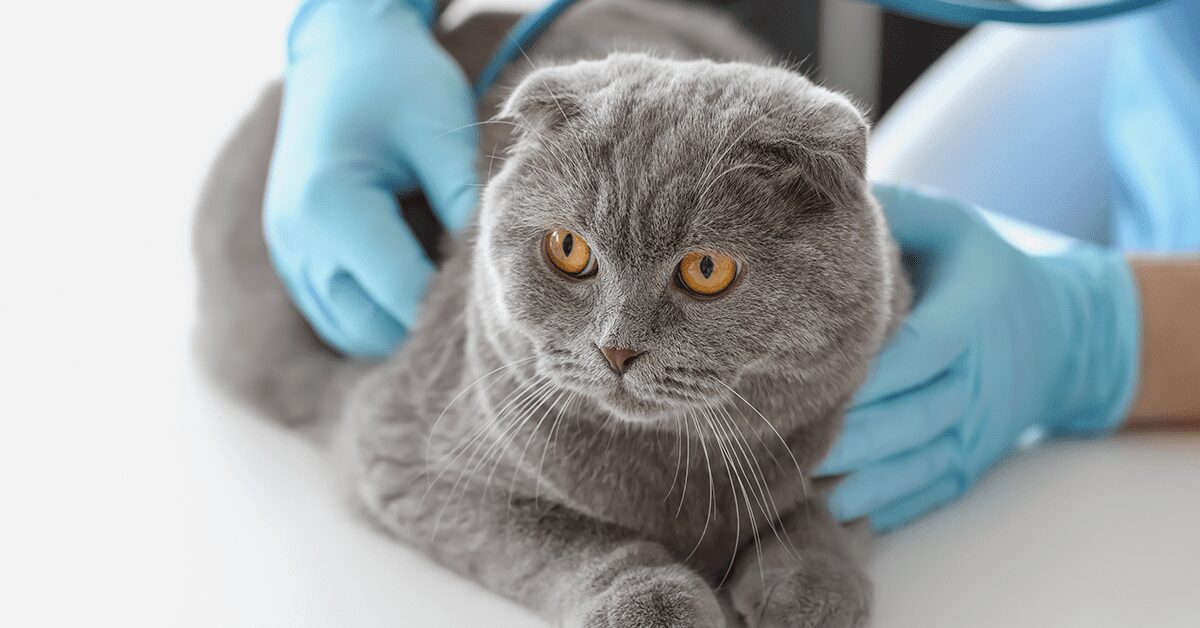Key Points
- Heart disease in cats is either congenital (present at birth) or acquired (developed over time).
- Although the exact cause of heart disease in cats is unknown, veterinarians believe that a cat’s genetics, lifestyle, weight, physical activity, and diet play an important role.
- Treatment options depend on the type of heart disease, how far it has progressed, and your cat’s age.
Just like their human counterparts, many older cats suffer from heart disease. When the heart doesn’t function properly, it can affect every organ and muscle in their body.
While it’s scary to think of your furry friend developing heart disease, with early detection and treatment, your kitty can still live a happy life. Here, we cover the symptoms, treatments, and types of heart disease in cats to help you give your cat the care they need.
Symptoms
Signs of heart disease in cats can be tricky to spot. Cats tend to appear normal in the early stages of heart disease, and may not show telltale signs until their condition has advanced.
According to Dr. Debra Eldredge, veterinarian at Cat World and author of “Cat Owner’s Home Veterinary Handbook,” early detection is extremely important. “You may notice your cat resting more and hiding from you, and an increased rate of open-mouthed breathing.” she says.
While not every cat with early onset heart disease will develop the following symptoms, the most common signs of heart disease in cats include:
- Loss of appetite
- Weight loss
- Lethargy or inactivity
- Weak pulse
- Shortness of breath or difficulty breathing
- Short or rough breathing sounds
- Inability to tolerate exercise or exertion
- Fainting/collapse
If your cat is experiencing any of the above symptoms or is in visible distress, bring them to your veterinarian immediately. If heart disease is caught early on in your cat’s life, treatment and management can mean a close-to-normal life for your cat. It can also slow down the progression of heart damage and prevent or slow the progression of secondary problems, like kidney failure or high blood pressure.
Causes
Heart disease in cats is either congenital or acquired. Congenital disorders are present at birth and include defects like holes in the heart and heart valve malformations, while acquired disorders develop over a cat’s lifetime. Cardiomyopathy refers to any disease where the heart is damaged, and is the most common cause of congestive heart problems in cats. When a cat has cardiomyopathy, the muscle of the left ventricle becomes so thickened that the heart can no longer efficiently pump blood throughout the cat’s body. There are three main types of cardiomyopathy:
- Hypertrophic cardiomyopathy (HCM) occurs when the left ventricle tissue thickens and can no longer fulfill its normal functions. This is also the leading cause of feline heart disease.
- Restrictive cardiomyopathy (RCM) is a buildup of scar tissue on the inner lining of the heart that reduces its filling and pumping abilities.
- Dilated cardiomyopathy (DCM) occurs when the muscular walls become too thin, and subsequently, the heart becomes too large and can no longer pump efficiently.
Although the exact cause of heart disease in cats is unknown, veterinarians believe that a cat’s genetics, lifestyle, weight, physical activity, and diet play an important role. Heart disease can be a result of changes in the anatomy of the heart that sometimes come with aging. In some cases, heart disease develops as a secondary problem to hyperthyroidism, hypertension, high blood pressure, anemia, and even heartworm disease. Congestive heart failure causes a cat’s heart to murmur, but not all heart murmurs are associated with heart disease. Cats can have intermittent heart murmurs, often when their heart rate is increased due to stress, which has no impact on their health.
Certain breeds are predisposed to developing heart disease, including Maine Coons, Persians, Ragdolls, and American Shorthairs. Typically, middle-aged and senior cats are more likely to develop heart disease, but predisposed cats can show signs as early as three months old.
Diagnosis
In the early stages of heart disease in cats, a physical examination is typically the only way to tell that your cat is suffering. This is done through several tests, which include:
- Blood tests: These test the function of most organs, including the thyroid and kidneys.
- Chest x-rays: This not only checks the heart size but also the condition of the lungs and fluid buildup.
- Blood pressure tests: This test ensures your cat doesn’t need to be treated for hypertension, which is closely related to heart disease.
- Ultrasounds: Also known as an echocardiogram, this allows the veterinarian to see what is causing the heart murmurs and measure how effectively the heart is working.
- Electrocardiogram: This procedure looks at the electrical currents in a cat’s heart muscle to determine if there are any cardiac rhythm abnormalities.
None of the above tests are invasive or painful. Depending on your cat’s age and comfortability, they may need to be sedated to undergo these tests. If your veterinarian thinks the heart murmur may be related to another disease, other tests may be recommended. Once a diagnosis has been made, your veterinarian will suggest a treatment plan based on your cat’s unique needs.
Treatment
Treatment options depend on the type of heart disease, how far it has progressed, and your cat’s age. When your cat is diagnosed with heart disease, your veterinarian will prescribe medication to help reduce the risk of congestive heart failure. These medications will help relax the heart muscle and decrease the heart’s workload.
If your cat has been diagnosed with congestive heart failure, they will need frequent follow-up visits and additional tests in order to monitor their heart health. Your veterinarian may also suggest introducing a low-sodium diet to keep your cat’s blood pressure stable. Remember, congestive heart failure and other heart diseases are progressive and change over time, as will their treatment plan. While most cats can recover from heart failure, this often requires treatment for the remainder of their life.
Prevention
The best way to keep your cat’s heart as strong as it can be is to give them a healthy lifestyle and bring them to the vet for routine checkups. Here are a few ways to ensure your cat has the best quality of life possible:
- Regular checkups: You should bring your adult cat or kitten to the vet for routine checkups and wellness visits at least twice a year to ensure they’re up to date on all vaccinations, inspections, and dental cleanings. Your veterinarian will pay specific attention to your cat’s heart with a stethoscope examination in order to catch any early signs of heart disease.
- Proper diet and exercise: The food your cat eats and how often they exercise plays an important part in their overall health. A healthy heart includes a diet that’s high in protein and low in sodium, so their heart can pump properly. A few minutes each day spent chasing a toy or climbing a cat tree can go a long way in preventing potential heart problems.
- Ensure comfortability: It’s important for cats to be comfortable where they live, so be sure to keep your furry friend’s life as stress-free as possible. This includes where they sleep, eat, and go to the bathroom. Make sure your cat has their own place to rest with soft blankets or cushions to lay on, which is away from any fur siblings or children in the home.
What to expect at the vet’s office
Veterinarians know how scary it is for both cats and their parents when heart disease is on the table, so they’re there to ease the pain and answer any questions you may have. Identifying any underlying health factors can help manage heart disease, so your veterinarian will start by measuring your cat’s blood pressure and taking blood and urine samples to check for anemia and thyroid issues. They will listen to your cat’s heart with a stethoscope to identify any heart murmurs, abnormalities in heart rate, and cardiac rhythm disturbances.
The bottom line
Cats are masters of disguise and tend to hide their illnesses pretty well. While an unexpected heart disease diagnosis can be scary, pet owners shouldn’t lose hope.
“Heart disease doesn’t have to be an immediate death sentence for your cat,” Dr. Eldredge says. “Many cats with cardiac conditions can be managed and controlled for a period of time. Keeping your healthy cat fit and active can also help them fight off any heart problems.” If your cat is exhibiting any signs of heart disease, bring them to your veterinarian right away to ensure they receive the care they need.
FAQs
How common is heart disease in cats?
Heart disease affects one out of every ten cats worldwide.
Is heart disease painful for cats?
While your cat may not show signs of pain in the beginning, heart disease may cause discomfort for cats if left untreated. The further the disease progresses, the more it can affect your kitty’s quality of life.
Is there a cure for heart disease in cats?
Although cardiac conditions in cats can be managed and controlled for a period of time, there currently isn’t a cure for heart disease in cats. Most medication eases the pain related to heart disease and helps reduce the risk of congestive heart failure.




